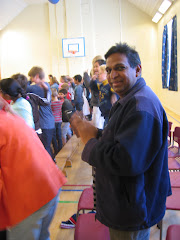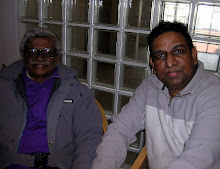
Late Justice Ramanathan’s wife Mano paying tribute
Justice P. Ramanathan’s death anniversary falls on December 6:
An exceptional, rare person in the cynical times
Prof. G. L. Peiris - Minister of Export Development and International Trade
---------------------------------------------------------------------------
It is not given to all of us, within the span of our own lives, to receive acclaim, honour and recognition of our life’s work. If any one receives that, it is not a matter of entitlement and I would say it is very much the exception rather than the rule.
The late Justice P. Ramanathan, belonged to that category of exceptions. During his lifetime he received many accolades in different spheres of life. Justice Ramanathan, was President of the Court of Appeal, Judge of the Supreme Court, Bencher of Gray’s Inn, Deshamanya, Governor of the Western Province, Chancellor of the University of Uva-Wellassa, Member of the Permanent Court of Arbitration at the Hague, Chairman of the Human Rights Commission of Sri Lanka to list just a few of the many honours that were conferred upon him. That is a measure of the richness, the fullness of the life he led and the diversity and the calibre of the contribution he made to the life of this nation.
I would like to tell you about certain characteristics about the late Justice Ramanathan, which I consider to be truly illuminating - a beacon light to all of us, qualities which are all too rare in the cynical times in which we live.
I remember vividly an interview which the late Srimathi Indira Gandhi gave on a very memorable occasion in her life. As you know, at the height of her power, she was probably one of the most dominant political leaders in the world. Then, she lost everything. She lost not simply political power, she lost her cherished son Sanjay, she suffered a humiliating defeat, she lost her seat in Parliament, she was thrown into Tihar Jail and she had to suffer every conceivable misfortune that could befall any human being.
Within two years she was back in power with a two thirds majority in Parliament. That was the occasion on which the BBC, in a celebrated interview asked Mrs. Gandhi: “Madam, you have tasted the ultimate in power, then you lost it all. Now you’ve got it all back. We are talking to you not as a stateswoman, not as the leader of the Republic of India. We are talking to you as a human being. What do you feel within you now, when you have got total power and authority back into your hands?” Indira Gandhi’s reply was, “I have trained myself not to react to these extremes in an unbalanced way. I don’t go overboard. When things are going well with me, I’am not ecstatic, nor am I unduly dejected when things appear to be going wrong. There is within me a certain equilibrium - a sense of poise and balance, which has enabled me to deal with all these calamities and vicissitudes - that is my answer to you.” That is what Indira Gandhi told BBC.
And it seems to me, that that is the essence of Buddhism. Mr. A. T. Ariyaratne who is in the audience, knows more about the subject than I do and I think he will probably agree with me that that is the inner core of Buddhism. Equanimity is a concept that is very difficult to describe. The Buddhist doctrine of Upekka I think, captures the spirit of it. And to my mind, the late Justice P. Ramanathan was an embodiment, a personification of that concept of Upekka or equanimity. That is the first thing I want to say about Justice Ramanathan.
The second is that he was a true friend, and I mean that very genuinely.
The most visible measure of it, was this. He had a great deal of time for people when they were down in life, not when they were up. He didn’t phone you when you were up, but if he felt you needed support, goodwill, his friendship, he was always there. He never ran after people in office that was not part of his nature. But if people had lost the kind of things they were accustomed to and they were feeling a little bit in the doldrums, Justice Ramanathan would call and ask “Could I drop in and have a chat with you, why don’t we go out for dinner.” That was the late Justice P. Ramanathan. I won’t give you examples of that. That would be invidious. But I can think of one instance in particular when a close friend of his, a leader of the Bar, a man who had tasted eminence, power, glory in many ways, but fell upon evil times and had to undergo a great deal of suffering, deprivation and abject humiliation. And Ramanathan stood by him like a solid rock when he was needed most.
I need hardly tell you, that is very rare quality in our midst. The third is this. There are many aspects of our culture which we truly value. There is no doubt about it. Speaking for myself, when I travel abroad - I never wanted to live in England for example for long periods, although I have spent time there - because, as the late Professor Nadarajah once told me, “we miss the sights and sounds of Sri Lanka” - that is part and parcel of our psyche. However, there are some other features of our culture which are not so attractive. And I think you will forgive me if I share this thought with you in a spirit of candour. One of the least attractive aspects of our culture is a certain spirit of envy. I will tell you a little story. A certain Ambassador/High Commissioner from a Western country, in my view one of the most perceptive foreign envoys I have ever met during the last 13 years, told me “my wife and I have spent so many years in this country, we’ve enjoyed every minute of it.
Yours is a vibrant civilization, we’ve enjoyed great warmth in personal relationships so much that you have to offer us. But we were struck by one negative quality which you may not notice because you take that for granted. But coming from outside and being exposed to it as foreigners, that particular aspect did make a deep impression on us.” And he told me, “supposing you invite a group of Professionals” - this is not what I am saying, but what he told me - “and in the course of the evening you make the remark, ‘don’t you think so and so is a wonderful person?” May be a Doctor, a Lawyer, an Accountant, an Architect, Engineer whatever, he told me you may be certain, that somebody is going to say ‘yes of course, but ..... and something would be added that would be very derogatory.”
This is a comment made by, as I say, one of the most perceptive foreign envoys that I have ever interacted with. What he asserts is a fact which we need to acknowledge. If there is anybody to whom envy and jealousy was totally alien, that was the late Justice P. Ramanathan. It was totally irreconcilable with his personality.
You know, in our country if somebody is undergoing misfortune - illness, bereavement, poverty - we tend to rally round, the extended family - all that is part of our cultural tradition, but we find it less easy, spontaneously and genuinely, to rejoice in the success of others that we are in contact with. That is why Ramanathan stood out as a very refreshing exception. His personality and anything remotely approximating to envy or jealousy, ill-will or rancour, were poles apart and were wholly incompatible with one another.
Ramanathan was a multi - faceted personality. He achieved distinction in the law, and that is epitomised by the singular honour that was conferred upon him by Gray’s Inn. But, as P.de.S. Kularatna, former Principal of Ananda College, told me when my grandmother took me to see him at that time I was at S. Thoams College and we were trying to make a decision about what I should do and I still remember one thing that he told me. He said “one must never be one, do many things in life” - that is something I remembered on several occasions when I had to make for myself, decisions which were important in my own life.
Ramanathan was never content with success in one field of human endeavour. I think that is a part of the reason why he was a fulfilled and contented personality. He was interested in breeding dogs, Dachshunds I think it was. Then, he held office in an amateur Sports Shooting Association. So he had a diversity of interests in life.
He took a great deal of interest in the activities of the Medico - Legal Society and at a Prize day address which he delivered at St’ Joseph’s College - the 95th annual prize giving of St. Joseph’s - he made some very pertinent observations about the value of English for our society. I think it would serve us very well to reflect on some of the thoughts that he articulated to that distinguished gathering on that particular occasion.
The last quality of Justice P. Ramanathan which I would like to refer to, is the fact that he was one of those people who felt genuinely at home and comfortable with people from all walks of life. Ramanathan, by birth and by training, was very much an aristocrat - he belonged to an elitist family. His ancestors and close relatives included his great grandfather Sir Ponnambalam Ramanathan, his great grand uncle Sir Ponnambalam Arunachalam. He belonged to the same family as the famous scholar Ananda Coomaraswamy, Sir Mutttu Coomaraswamy, Sir Arunachalam Mahadeva household names in the history of Ceylon during that period.
But he didn’t have to make a special effort to try to relate to people from a different background in society. It came very naturally to him. And that reflects the measure of the fullness, the flexibility and the resilience of his personality.
His work in the law was dominated in my view by two things. One was a sense of compassion. Ramanathan came up the hard way. There was at least one occasion in his life when he could have taken a short cut to high office. That arose because of a certain combination of circumstances during a particular period. But he turned down that opportunity - he didn’t want to make use of opportunities of that nature. So he served in Courts up and down the country - Kurunegala, Anuradhapura, Matara and so on. And finally ended up in the Apex Judicial Tribunal of the country. But in his application of the law he always demonstrated consistently, a sense of compassion. If there were two available courses of action, he would invariably lean in favour of that course of action that was consistent with compassion.
Secondly, Ramanathan realised that the law cannot serve a useful purpose if it is sought to be applied in a vacuum.
It must come alive in the social experience of the community which it is endeavouring to serve. So he always gave the application of the law a substantial sociological content. And there were occasions when that required a high degree of moral courage, but he was never lacking in that kind of intrepidity and fortitude.
Summing up what I have tried to communicate to you, Ramanathan could have lived longer. Today, medical science being what it is, one would say that he died relatively young. But have told Mano, that there’s no reason really to regret that because he led a full life in every sense of the word. And as Mano has quoted in the elegant booklet that she has prepared.
“To live in the hearts of those you leave behind, is not to die”.
I think the secret of his inner serenity and tranquillity is this, Ramanathan belonged to very distinguished Hindu family. And it is quite likely that he was inspired by the famous words in the Bagawat Githa. I have quoted this particular passage to two Heads of State when they seemed to be having unusually difficult problems. It is a passage that is worth referring to on this occasion. The passage is this. Arjuna is the world’s champion Archer.
Arjuna is going into battle. This is weighing on his conscience in a very oppressive way. He knows before the day is done he would have killed hundreds of people because of his skill in Archery - he didn’t want to kill anybody. But he thinks that is going to be the result of his actions. God Krishna appears in the form of a charioteer. And Arjuna unburdens himself of Krishna. He said, this is going to happen to me and I feel very sad and depressed about it. What solace can you offer me. Krishna’s response to Arjuna is memorable. He says, “you are but a mortal human being. you can only do your best. Thereafter the consequences of your actions are not for you to decide upon, they belong to a higher realm, an ethereal realm. Do your best, be content. Don’t torment yourself about the consequences of your actions”. Ramanathan did his best, he led a life that enriched not only his family, his friends, his relatives, but the Sri Lankan community at large.
And the final instructions which he left Mano - I want you do dispose of me as simply and as rapidly as possible. The first berth at A.F. Raymond’s and then the first berth at the crematorium. But something else is very characteristic, very typical of the late Justice Ramanathan. He made a special request and of course that was carried out by Mano. He wanted Frank Sinatra’s ‘I did it my way’ to be played at A.F. Raymond’s funeral parlour just before his body left for Kanatte cemetery. And he certainly lived his life his own way.
The way he lived his life is an example to all of us at a time when many of us are tempted to succumb to a certain spirit of cynicism and scepticism and there can be no more powerful antidote to that sense of scepticism than the life and the work of the late Justice P. Ramanathan.
Based on a speech by Prof. G. L. Peiris at a remembrance ceremony of Justice P. Ramanathan
dailynews.lk




.jpg)

































No comments:
Post a Comment